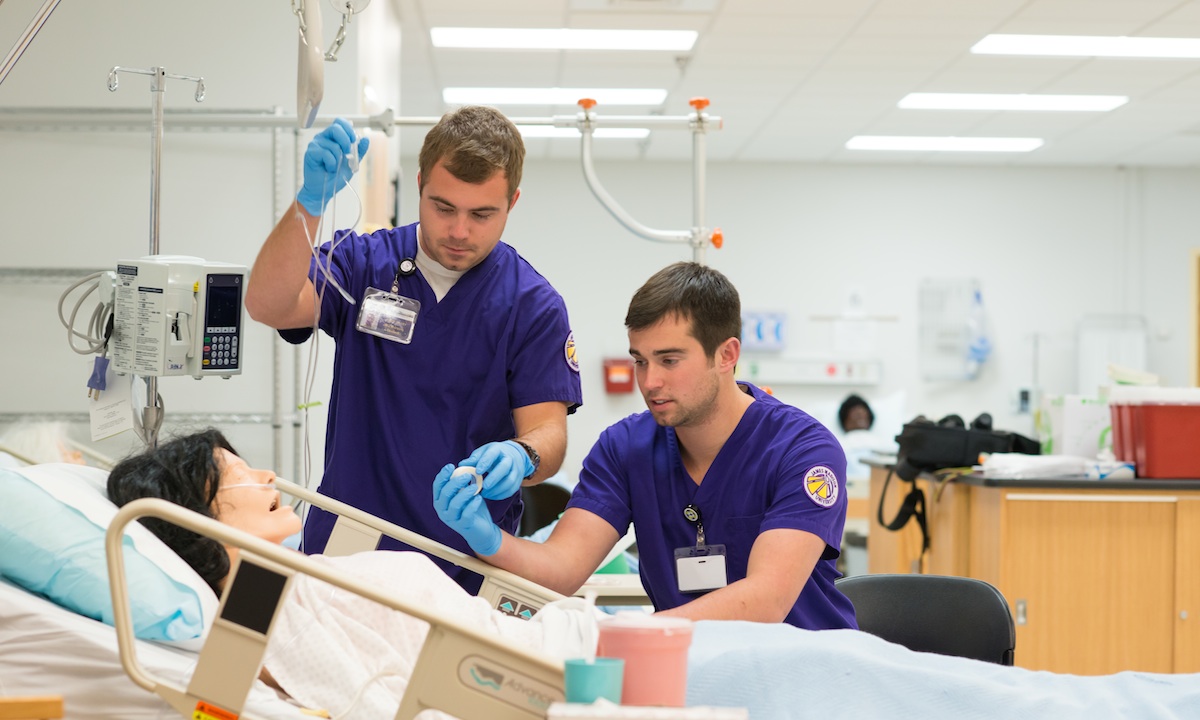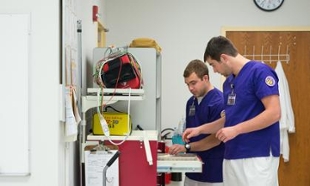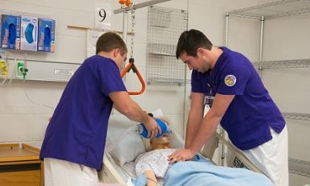More men choosing nursing as a career
JMU News
Challenge and change
Eric Croucher and Justin Dailey both knew they wanted a challenging, rewarding career with the opportunity to make a difference in people’s lives. That’s why they chose nursing.
“You’re going to get a job that will challenge you intellectually … ...You will be happy with your career. You’re going to make a difference in someone’s life.”
“When my friend came down with leukemia and I spent the night with him in the hospital, the family was on a first-name basis with the nurses,” Croucher said. “By being a nurse, you’re always advocating for the patient and looking out for them.”
Dailey also saw the comforting effect nurses can have while visiting a friend who had been in a life-changing car accident. “I could truly see the impact that nurses had on his family,” he said. “I decided that I wanted to practice medicine, but I chose the nursing route for its interpersonal aspects and the patient contact.”
Despite these rewards, many men still don’t consider nursing as a career. In previous years, the number of men in JMU’s undergraduate nursing program has maxed out at four. However, this is starting to change, according to program head Dr. Julie Sanford. The incoming class has 10 male students.

Time is right
Croucher believes that as society becomes more progressive, many of the stereotypes surrounding the nursing profession are disappearing. “Guys are starting to put their egos aside and say ‘hey, you know, nursing’s a great career. I can make money. I can support a family,’” he said.
Croucher, who served as president of the Virginia Nursing Student Association and is the March of Dimes’ Virginia Student Nurse of the Year, said gender wasn’t a factor when deciding on a major.
Likewise, Dailey was aware that nursing was a female-dominated profession, but says that never made him hesitate to make the switch because he “understood how challenging and rewarding this profession is.”
Croucher graduated from JMU with a bachelor’s degree in nursing this month. In addition to his studies, he started a charitable organization on campus, Be the Match, and registered 135 people to be bone marrow donors. He hopes to one day become a pediatric oncologist and help brighten the days of children with cancer. “They’re dealt such an unlucky hand. It’d be a treat to make their day better,” he said.
Sanford said Croucher has been a strong proponent of male nurses, persuading several of his friends, including Dailey, to switch their majors.
Despite his belief that attitudes toward male nurses are changing, Croucher still encounters stereotypes. During his clinical hours at Rockingham Memorial Hospital, some of the older men frequently called him “doc” and asked when he was going to become a doctor, falsely assuming that he was a medical school student. And some patients were simply uncomfortable having a male nurse, he said, and requested that he switch with one of the women on staff. But Croucher “takes it as it comes” and doesn’t let it offend him. “You really never know how someone’s going to take it, but that’s part of the unpredictability that makes nursing fun.”
Neither Croucher nor Dailey have any complaints about the number of men in the program at Madison.
“I honestly forget sometimes that there are only a couple other guys because everyone is treated equally within the class,” Dailey said.
Croucher said of his 60 classmates, he felt like he had “56 sisters.”

Numerous opportunities
For men who choose nursing, the problem, at times, can be finding a mentor. There are only two male nursing professors at JMU — both of them part-time — and few men in the field for students to look up to.
Croucher was lucky enough to receive a male nurse as his preceptor, or teacher, at RMH. Yet he is adamant that gender doesn’t play a role in who he chooses to admire. “I wanted to see how they dealt with patients and if they could create that trusting therapeutic relationship — that’s what I wanted to mirror.”
'“The opportunities that I’ve had here wouldn’t have been possible if I went anywhere else.'
Dailey agrees. “It would definitely be nice to have more males as mentors in the nursing profession, but all of the female nurses I have come across in the clinical setting welcome me with open arms,” he said.
Both students credit JMU’s nursing program for the numerous, valuable educational opportunities they’ve had.
“JMU just fosters greatness,” Croucher said. “The opportunities that I’ve had here wouldn’t have been possible if I went anywhere else. The fact that I could start a cancer organization for something that I had a passion about is unbelievable … JMU makes you a better person.”
Croucher would like to eventually move into nursing administration and help recruit more men into the profession. He would tell any man thinking about making the switch: “Look, you’re going to get a job that will challenge you intellectually … You can be that shoulder to cry on, the person that gets that tray of food for a family. You will be happy with your career. You’re going to make a difference in someone’s life.”
###
Jen Eyring (’14)
Dec. 17, 2013

